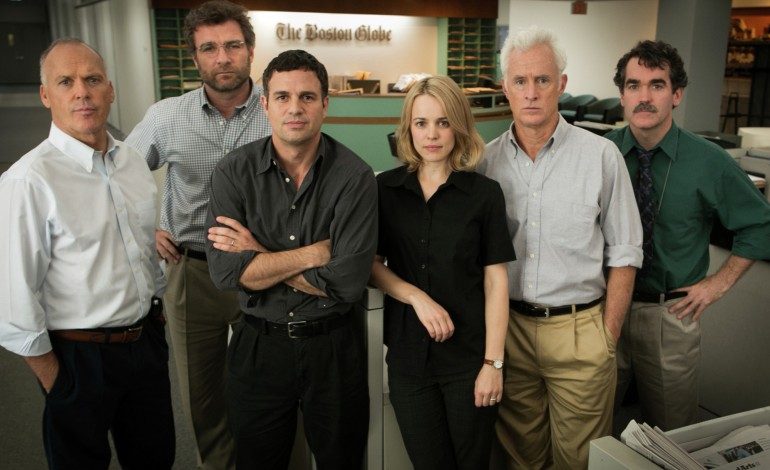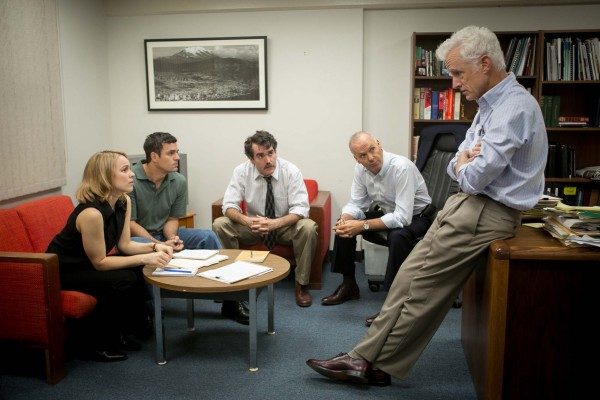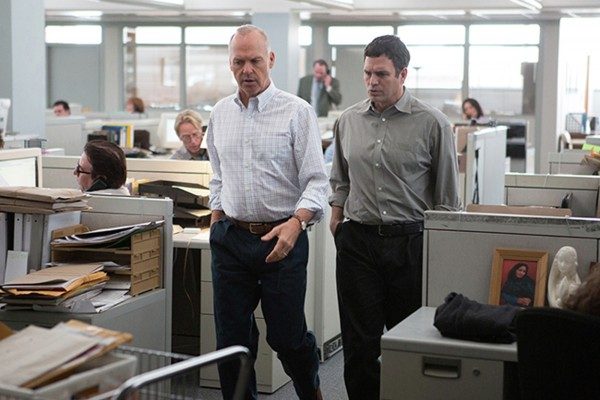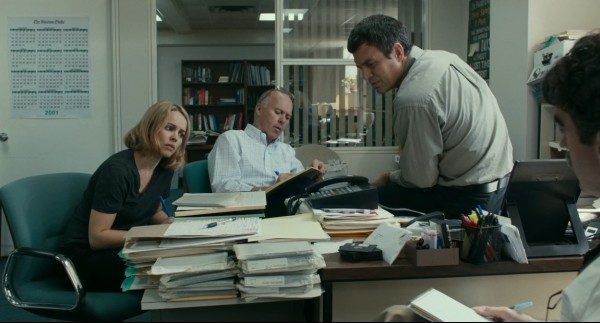

It is a story that no one necessarily asked for but one that needed to be told. That is the case for both the story played out within the journalism drama Spotlight as well as the reason for making the movie in the first place. The film centers on the true story of the Boston Globe’s investigative journalism team Spotlight, that exposed the controversial cover-ups of Catholic court cases in the years between the mid-1970s and 2001 regarding a number of Boston priests and the molestation of young children.
Understandably a difficult subject to tackle as well as watch, seeing the movie felt more like an obligation rather than an enjoyable experience; and once the credits rolled, that obligation was fulfilled. Regardless of the discomfort associated with seeing Spotlight, the film is at its core a highly respectable and true testament to ethical journalism and an historical triumph of the first amendment.
Up screenwriter Tom McCarthy is the filmmaker who was gutsy enough to put this story on screen. His script (co-written by Josh Singer, The Fifth Estate) follows a team of investigative journalists played by Michael Keaton (Birdman), Mark Ruffalo (Foxcatcher), Rachel McAdams (Midnight in Paris), and Brian d’Arcy James (TV’s Smash). At the prompting of their brand-new (Jewish) editor, Marty Baron (Liev Schreiber, TV’s Ray Donovan), the Spotlight team digs deeper into a recent court settlement between a Boston priest and several of his sexually violated victims – a settlement whose records were legally kept from the press and public eye and which many journalists simply passed over. Soon they uncover a whole system of sexual abuse scandals within the local Archdiocese – mostly hidden at the hands of Cardinal Bernard Francis Law – that certain members of Boston’s large Irish Catholic community had also negligently swept under the rug for decades, and which shook up the Church and Boston community forever after.
McCarthy’s look and feel is a bit impersonal. It is characterized by grainy visuals and direction that connotes an outsider’s perspective as the audience puts together the fragmented pieces along with the team. At one point in the film, it is said that the obligation of this news story is not about the individuals, but about a system. The film’s story and perspective match that sentiment throughout, focusing on the dismantling of first amendment roadblocks for the victims of sexual abuse put in place by a religious institution that most – legislative branch included – would not (and did not) think twice about challenging.
In kind, the stars and characters of the film took second seat to the wider importance of the investigation. Each actor does commendable work with their mildly developed characters, particularly Ruffalo, who has proved himself quite consistently onscreen within the past few years. He is impressively able to create subtext for his character Mike Rezendes almost solely through his finely crafted idiosyncratic performance for which he incorporates facial ticks and hurried speech that suggest an underlying journalistic restlessness. Also, his interactions with rogue defense attorney Mitchell Garabedian (Stanley Tucci, The Devil Wears Prada) prove to be some of the film’s juiciest scenes. McAdams and former Oscar nominee Keaton deliver much more subdued performances; however, they comfortably match the story’s gravity and sensitivity.
The film, at its forefront, is actually an exploration of ethics in journalism. There was clearly as much of an ethical obligation to tell this story on film as there was for the Spotlight team to write and expose it. Approaching this controversial material from that standpoint was incredibly intelligent on McCarthy’s part. He is able to carefully and respectfully broach the systemic silencing of oppressed voices through another system put in place to counteract that silence: the media. As these journalists exercised their duty to impartiality and dedication to the truth, so did McCarthy in telling their story.
It is significant that the film does not blindly glorify the Boston Globe or its reporters. The story reveals through Keaton’s Walter Robinson and his supervisor Ben Bradlee Jr. (John Slattery, TV’s Mad Men) that this story had even been looked over by them and the paper at various points over the years, a fact which indirectly connects the team to the community and the complicated web of negligence. This also shows McCarthy’s meticulous understanding of his own ethical responsibility to get the story right.
Despite the laudable focus on allowing these unfortunate atrocities to be heard, one voice was noticeably left out of the film: that of the Catholic community. We do briefly see several Church representatives such as Cardinal Law or the Principal of the local Catholic High School and their involvement in downplaying and subverting the pervasive issue. What we don’t thoroughly get to see though is the impact this had on the local Catholic parishioners by which much of these events unknowingly occurred right under many of their noses. McAdams’ Sacha Pfeiffer is revealed to periodically attend mass with her Catholic grandmother; after the exposé is published, the film features a subtle blink-and-you’ll-miss-it clip in which we see the grandmother’s shocked and hurt reaction while reading. This is the only indication of the news’ effect on churchgoers, and seems to be the only small area in which the film’s reporting is lacking.
Verdict: 4 out of 5
Spotlight will be a film that some viewers will definitely enjoy and others will find particularly troubling, but that comes with the territory. McCarthy, Singer, and the film’s stars set out to ethically tell the story of local media and its small triumph over a violation of both civil rights and a system’s abuse of its political and spiritual power, and they accomplish just that. The movie does, however, leave some loose ends untied and leaves audiences with a somber tale that essentially remains somber at its conclusion.



